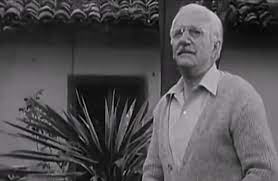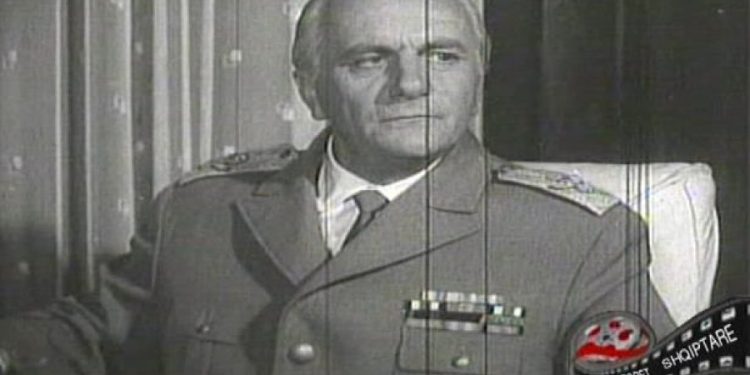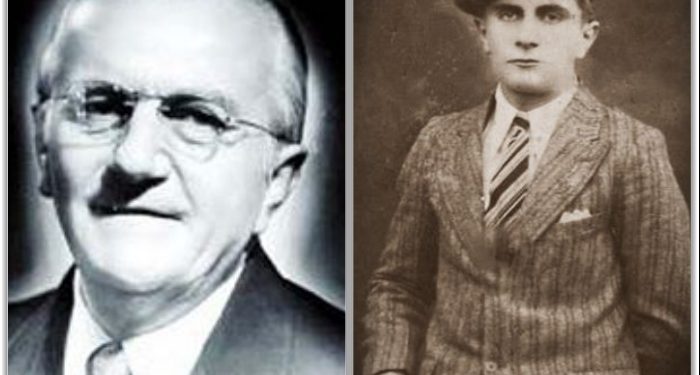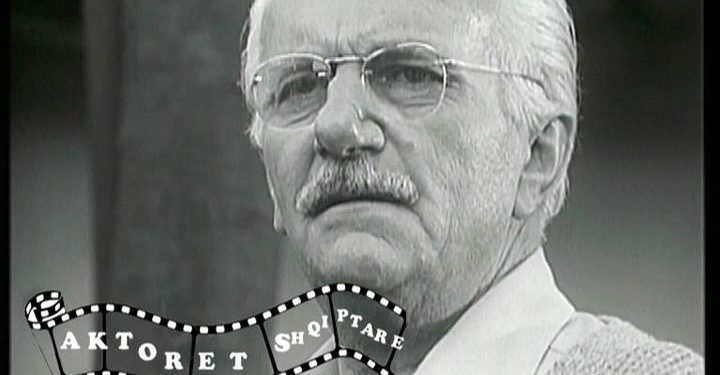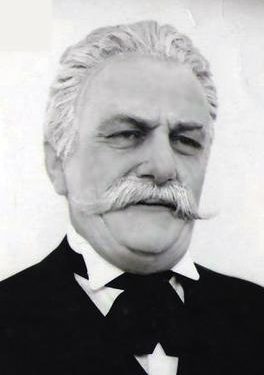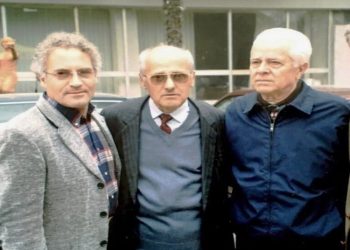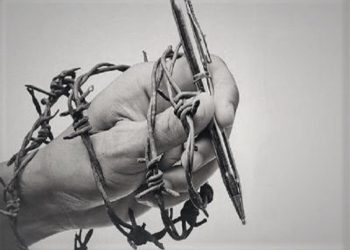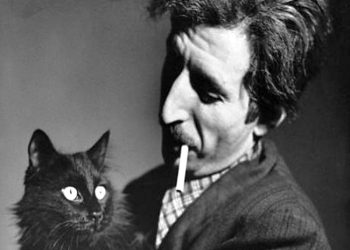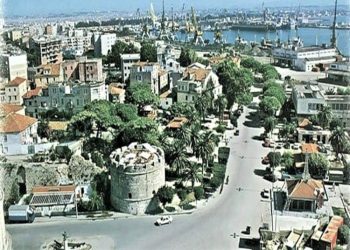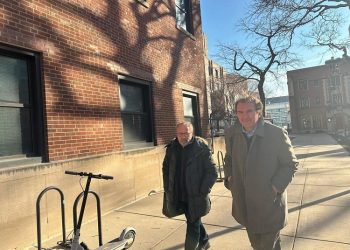From Baxhul Merkaj
Memorie.al / Pjeter Gjoka is no more. For many years, Albanian televisions no longer broadcast film sequences from his roles, but, nevertheless, the authority of the genius of the Albanian stage was still felt in the corridor of the former National Theater, where his picture was viewed with curiosity and respect by thousands of fans of art. When Pjeter Gjoka died, many theater actors said: his death is a legend, because he will live with his roles in the memory of generations. Now more than four decades have passed since the day of his death and respect for the great actor has multiplied.
Pjeter Gjoka was born in August 1912, in Ulcinj. At the age of 4, he settled in Shkodër. Her mother was from Salca e Nikaj Merturi (Tropojë), while her father was from Dushmani, Korora e Dukagjini. In the first years of his youth, he was very active in athletics, as well as as a football player of the “Vllaznia” team. In 1930, he represented Albania in the Balkan Games, in Greece. He has set the national record in one, or three steps. This record was broken in 1964, for young people. The “People’s Artist”, Pjeter Gjoka, has been on stage his whole life. He experienced and interpreted 114 roles, types, characters, outside of personal glory, but giving priority to the success of theatrical art.
The types and characters pitied by him are characters in the process of internal psychic development. The great actor Pjetër Gjoka has many qualities in common with his colleagues, but he has special ones, which we will reveal in these notes. It was 1976, the festival of dramatic theaters was taking place. The jury announced the awards, the first prize for the best actor went to Pjetër Gjoka. He went on stage, accompanied by his assistant. There, the assistant, after receiving the award, directed it to the artist. Peter stretched out his hands, but he was blind and did not immediately find where the winner’s cup and the bouquet of flowers were. The gold lovers in the hall understood that he could not see from his eyes and applauded him for a long time.
Artist musician
Pjetër Gjoka participates in the band of the city of Shkodra, where he used the horn as a wind instrument, at which time his daughter’s son finished school in Germany for the horn, named Gent Lazri. But the artist was also a singer. He received his first lessons as a singer from the priest teacher (who after the 90s became the First Cardinal of Albania), Mikel Koliqi, and the school director at that time, Patër Gjergj Fishta. During these times, in a conversation, Mikel Koliqi said: “I had Pjeter Gjokë as a student and he was a very good tenor”. Tefta Tashko Koço held a tour in Shkodër at that time. After listening to the church choir, he was impressed by the soloist Pjetër Gjoka. He met him and asked him: – “Do you want to go abroad to Italy, to study as a singer?” I can fix you”? The artist replied: “I have two old men at home, I’m alone, they’ve taken care of me and I have obligations towards them. Thank you for your care”!
Peter the child
Ulcin, August 2, 1912. Lucija e Ugashë, a male child so expected in the Gjoka family, Pjetrin, would be born. In the years when the city was emerging from the framework of the city-castle, Gjokaj’s son would spend the first three seasons of his life. His family would settle in Shkodra in 1915. Shkodra welcomed them with rain. There, the life of the one who would later be the “People’s Artist”, Pjetër Gjoka, would begin.
This is how the actor remembered his arrival in Albania years later. “Even today, at this age, I feel those cold curls, which like an iron hand passed over my face, with a frozen, icy caress, as if they wanted to drown my cry for bread.” He would take his first lessons at the Franciscan school in the same city, and his teacher would be Father Gjergj Fishta, with whom he would have many memories. One of them is the one that belongs to the day when little Peter, after the lesson, went to bathe in the river Kir and jumped from its bridge.
Then, as he himself would confess, Fishta, who did not speak twice, had shouted at him and made him put his finger on his head. Peter was born a few months before the mother country declared independence. Years later, he would say: “I waited for the declaration of Independence in diapers.” I don’t know if I cried or laughed that day. But now it seems to me that I would have laughed more than cried.”
The beginnings of the artist’s work in the theater
Already in the 1930s, Pjetër Gjoka took part in the drama “Two Princes and a Maiden”, in Shkodër. The first role was in “A dead man”. He was playing in an amateur theater, but his friends, who were also amateurs, got into a basement and during the performance decided to harass him, piercing him with a needle from under the stage. The scene of the role of the dead lasted 15 minutes, he did not move, he stood as if frozen, but his friends continued to pierce him, thinking that the needle had not reached his body. When the curtain closed, he didn’t move. After a while he got up and said: “Remember that I didn’t feel it, see the place full of blood.” The role was the dead man and I played the dead man…”!
Cultural societies then also moved around the districts. They came and gave a show in Tirana. The show was called “The Return of Skenderbeu to Kruja”. There, Pjeter Gjoka played the role of the 70-year-old old man, who is sent by the brave men of Kruja to Istanbul, to fill Skënderbeu’s mind, to return to Albania. The artist was then 23 years old. The show was watched with interest by many viewers, including families from Shkodra, who lived in Tirana.
A girl who had come to her uncle, when she saw the show as a family, said: “How beautifully that old man plays.” The cousin returns and says: “He is not an old man, but a young man!” That young girl, after a few years, Liza Gjoka, who in her youth interpreted Schiller’s ‘Marie Stuart’, becomes the wife of the “People’s Artist”, Pjetër Gjoka. Therefore, during his life he often said: “I dedicate a part of my success with all my heart to my wife, Lizeta.” The actor did not leave the stage for 52 years.
Entering the theater brought him something new, previously unknown, simple, understandable to the actors of that time, where theatricality, declamation, unnatural play prevailed. Whereas Pjetër Gjoka’s stage play was understandable, vital, clear, natural, effortless, easily grasped by the spectator. His game was liked not only by old actors, who expressed admiration, but also by young actors. His stage performance was believable. Pjetër Gjoka entered the National Theater in 1945, where he presented himself with a role in the play “Te fundërrinat” by Gorky. In the same way, Pjetër Gjoka has helped in the understanding and crystallization of the physiognomy of the National Theatre.
Already at that time he was admired by the spectators and applauded by them. On the path of performing arts. he continued in the roles of “Governor of the Province”, “Makar Dubrov”, “Halili and Hajria”, in the role of “Shpend Gets the Elder”. In this figure, Pjeter Gjoka seeks freedom with popular simplicity. The beautifully artistically realized figures were also in “Revizori”, “Othello”, “Grayed Girl”, etc.
Artist Gjoka has always tried to interpret all roles, starting from individual data. In the role of the poor musician, he demonstrates the simplicity of the image, the musician’s love for his son. The figure of ‘Miller’ in “Love intrigue”, Pjetër Gjoka gave a father with the best virtues. This role is one of the most performed by him.
The “People’s Artist”, Pjetër Gjoka, stood out in many roles in the cinema as well, such as in the movie “Tana”. Prominent is the role of ‘Tasim’, a well-known doctor, but who has “microbourgeois waste”. “In this role, he gives importance to the word. The study of the text is necessary for the actor and he should not underestimate it”, – emphasized the artist himself. Some of his other roles are in “Hamlet”, “Noble Bourgeois”, “King Lear”, “The General of the Dead Army” and later “Arturo Ui”, performing with virtuosity the role of “Dog Zboru “. As time passed, but the great actor did not stop his connection with stage art.
His theatrical play was restrained, without explosions and full of emotions. She was brilliant and had her own originality, unlike the impulsive temperament of the artist Naim Frashëri. Pjeter Gjoka was and remained an artist with power and authority. Even though he retired, he never stopped working. He worked in the theater, film and appeared on stage himself, in various dramas. This happened in Tirana, Vlora and recently in Gjirokastër. Bashkim Kozeli, the well-known playwright, confesses: “It was May 1, 1982. Pjeter Gjoka worked with me for the staging of my drama ‘Pyesni malet’, with the troupe of Gjirokastra. He worked with a lot of spirit and the drama was given successfully. I call the chance that this drama gave me, to work with the genius of the Albanian theater, a great luck”. While Drita Pelingu, the well-known Albanian actress, confesses: “I had Pjeter Gjoka as a friend and director. Special as a director, was the permanent reference to life examples. He assigned fundamental importance to the processes of recognition, for the supply of emotional memory, the enrichment of the actor’s life baggage”.
The Turkish prince and “Skanderbeg”
Another successful role of Pjetri would be that of Lleshi in the drama “The Return of Skenderbeu to Krujë”. The drama, performed in 1937, was staged on the occasion of the 25th anniversary of Independence. Pjetër Gjoka played successfully alongside Loro Kovac, in the role of Skënderbeu. Lleshi would go to Istanbul, to fill Skënderbeu’s mind to return to Albania. The role itself embodied folk wisdom. Warmth and harshness melted into each other.
The show organized by Loro Kovaçi, after the great success in Shkodër, on November 28, was to be performed in Tirana, which was filled with amateur troupes on those festive days. The drama was scheduled to be performed twice, at 5:00 p.m. for the citizens and at 8:00 p.m., for the King, dignitaries and guests. Its premiere would be accompanied by many vicissitudes that, even today, are still fresh among the few viewers who are still alive.
“The vicissitudes, – as Pjetri told, – were connected with the arrival in Albania, invited by King Zog, of the son-in-law of the Sultan’s Palace, the Turkish prince, Habib. The amateur theater troupe was asked to perform in front of the King, the government and the “honorable friend”, with only one condition, that the performance be subject to censorship. In the morning, Zogu’s interior minister, Musa Juka, along with his staff, came to see the show. After seeing it they made some remarks. They were told that if they wanted to show the fourth act, as well as some fragments from the second, in particular any insulting words directed at the Turks, would be removed.
“We should not offend and anger our honorable friend, custom does not require us to do such a thing”, said Musa Juka. After Loro Kovac’s remarks, Minister Juka nervously shouted: “Do as I say, otherwise I will imprison everyone. Knowing well the values and needs of his fellow citizens, Juka, as he left angrily, whispered: “Okay, just give them to the people, we don’t care about this.” Its culminating point was the moment when the old man Llesh (Pjetri), upon the arrival of Skënderbeu in Krujë, lowered the Turkish flag and raised the Albanian one. This caused the spectator to become delirious and call out; “Long live Albania”.
Roles
Another drama that we will stop at to show another interesting moment is the one with the title; “Two princes for one girl”. A three-act play, it was written and staged by Henrik Lacaj on April 26, 1939. In addition to the subject and performance, the play also marks the first appearance on stage of a girl, Maria Markut, who performed in a troupe of men. On this event of the Albanian scene, Pjetri said that; “All the wives of the actors assisted in the rehearsals, so as not to leave Marije alone, while the director would leave one side of the stage to her for entry and exit, not allowing any actor to go from that side.”
Although in Andrea Skanjeti’s monograph, Pjetër Gjoka’s participation in the drama “Dedë Gjo Luli” is not reflected, through his personal memories, we are acquainted with the realization of the main role of the piece by Gjoka. He had the role of Deda, a performance based on a deep knowledge of this figure. Among the dramas presented by the “Bogdani” society, there is also “Gypsy Justice”, translated as it was used to be called freely at that time by Pjetër Gjoka and Kolë Çuni. The notebook where the drama was written, is kept in the family of the actor Pjetër Gjoka, with his original writing. He would also interpret the role of Zabelin, in “Kremlin Hours”.
Blindness
The well-known director Albert Minga, recalling the “People’s Artist” Pjeter Gjoka, says: “We were shooting the film ‘The Third’. All the preparations were ready. The director ordered: – Silence, the shooting begins. Scene: actor Gulielm Radoja, would light a cigarette during the conversation. The artist Pjeter Gjoka would smoke a cigarette and answer.
The scene was going well, but at the moment, the director stops the shoot. “Mr. Peter – excuse me, but in a luxurious office, the cigarette is not shaken on the table, but on the taketuke”. At that moment Pjetri checked around the place where he had placed it before and because he didn’t find it there, he answered: Someone has played it from the place where I have placed it, because because I don’t look, I try things several times so that I don’t get embarrassed on the set “?!
At that exact moment, Guljelm Radoja admitted the mistake and said that he had made the movements on the table. Then Peter ordered him: ‘Please, next time’ do not move any objects from the places where I put them. Here I am clarifying. I come an hour and a half before you and place the objects in such a way that they do not hinder you, you know that I do not see…”!
These were some of the impressions of his fellow artists, for the great master of the Albanian stage, who throughout his life is remembered for his correctness and the implementation of strict discipline at work. For this reason, during the conversation I had with his son, the actor of the National Theater, Gjovalin Gjoka, I learned about the major work of the artist Pjetër Gjoka, how he worked with the role during the years 1975-1977, when he was not watching. “I recorded the role of the partner as well as his role on the tape recorder. Thus, he appropriated the text”, says Gjovalini. And after two years of darkness, the artist underwent an operation in Italy and the light of his eyes returned. “My eyes were closed, the doctor removed the bandages, my light went out. I closed them at once, so as not to lose this light that came to me”, said Pjeteri about these exciting moments of his life. For this moment, Gjovalini says that his family and the entire artistic environment are very happy. Pjeter Gjoka had a weakness for children. Every day he went to the bed and touched the little granddaughter, who was four months old at the time. He could not see his granddaughter’s face, but he asked the woman: “Please, tell me how her hair is?”!?
And there and then he described with his imagination, the portrait of the little girl. However, when the light of his eyes came, they were all surprised. He didn’t meet any of us, saying: “Open up, all of you, I’m going to see Aurela first, because I don’t know her at all.” You told me that she is beautiful, so I have to hug her,” he told the other family members. And Gjovalini says that he went to the bed where he was sleeping, kissed him, and said: “The dog is just as I imagined.”
Pjëtër Gjoka himself, regarding theatrical stage art, has said: “We were all working, ever since the director threw the platform. In the beginning, we read the work according to the director’s requirements, thinking and searching to find the scenes, the events, that is, the previous life of the character, until a life similar to this character entered the drama.
Thus the thought would come out more mature, more convincing, because the actor penetrated deeply, the psychology, the cultural formation of his hero. Under the direction of the director, we emphasized that at the table, the lines, the subtexts, the connection with the partner had to be clearly evident. In addition to the connection with the partner, we established deep internal connections with the figure we were interpreting, entering into her special thoughts and psychology”.
Memory
In his artistic life, Pjetër Gjoka has been both a musician and an actor. As such, there are many parts he has staged. From the dramas written by the masters of Albanian literature, the best for the celebration of the anniversary of Independence, in November 1945, is the tragedy “Judas Makabe”, written by Father Gjergj Fishta. With a subject taken from the Bible, as Zef Zorba underlined: “the tragedy was the end and the main accusation against any kind of power and any treason against the motherland, it surprisingly suited the waves of the political situation. through which the nation was going”.
For this, the artist Gjoka would say: “It was suitable for our case, but we wanted, like the dramatized text, not to have a foreign music, but a music specially created for the events and heroes of Fishta’s work”. In order to realize this, a group of artists from Shkodra did the impossible and released Prenka Jakov, who was the only one who could make music, from “house-prison”. The preparations to put it on stage would not go unnoticed by the State Security bodies. Indirect threats to the initiators began.
For this, Pjetri recalled: “On a night with a storm of rain and wind, a State Security unit knocked on my house. During the questions they asked me to prove my identity and to prove where and with whom I had spent my time, it turned out that I had stayed all day, until late at night, in the premises where the melodrama was being worked on.”
The tense political situation of the time meant that permission was barely obtained from the then Minister of Culture, Sejfullah Malëshova, a “supporter” of Fishta. But even after that, the show would be banned by the communist regime. After many efforts, the premiere of the show was given on November 28, 1945, in the “Rozafat” cinema hall. Against the requests to repeat the show, the communist decision “stop” came. The end of this show, where Pjeter played the priest, marks the end of Pjeter Gjoka’s vocal activity.
In the personal archive of Pjetër Gjoka there is also a notebook, which, although yellowed by time, shows the date 24.10.1957. With a handwriting, the role of Zabelin is written in this notebook, while four sheets contain notes related to the performance of the play, where there is no shortage of evaluations and remarks for each role. But the actor, the many roles as a northern mountaineer, over time, seems to have worried him. For this he would say: “I am against stamping the actor. They say that I am cut out for the roles of mountaineers, but I do not accept this. I like to break myself. There is nothing worse for the actor, when he is prophesied…”! He is known as one of the actors who performed roles, even though he was blind. In the National Festival of Theaters, he would participate in the role of Pilo, in the part “Mark me too”. He took on that role with great desire, aware of the difficulties that blindness brought. In such a situation, Gjoka would say that; “It’s a great misfortune not to know how to read, but it’s a greater misfortune when you know and you can’t.”
Pjetër Gjoka’s big pawn…!
From the monograph “Pjeter Gjoka, 52 years on stage”, we unfortunately remember that when he passed away, he took a hostage with him. In the last days of his life, drawn to national figures, Ismail Qemali’s monologue, held on the day of the Declaration of Independence, attracted him a lot.
Regarding this, he would say: “In two years it will be the 70th anniversary of the Declaration of Independence. Coincidentally, I also turn 70 that year. I have a dream as an actor. To play Ismail Qemalin. Surely that year, there will be a movie or a drama about it…”! The dream remained a dream, a pleasant vision, unrealized, because he passed away on May 2, 1982. Memorie.al




